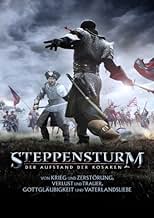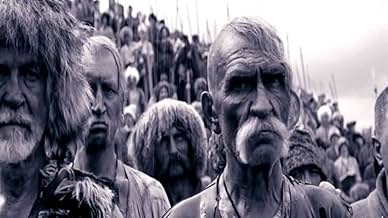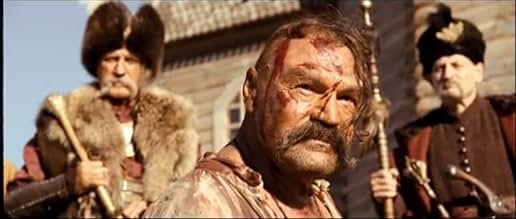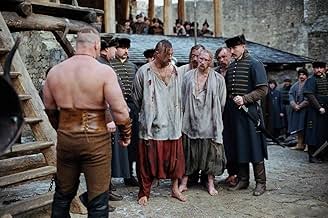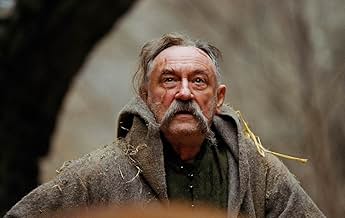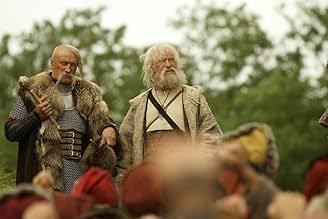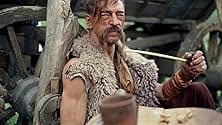CALIFICACIÓN DE IMDb
5.7/10
3.6 k
TU CALIFICACIÓN
Agrega una trama en tu idiomaSet in the 16th century, this is a story about Ukraine's Cossack warriors and their campaign to defend their lands from the advancing Polish armies.Set in the 16th century, this is a story about Ukraine's Cossack warriors and their campaign to defend their lands from the advancing Polish armies.Set in the 16th century, this is a story about Ukraine's Cossack warriors and their campaign to defend their lands from the advancing Polish armies.
- Dirección
- Guionistas
- Elenco
- Premios
- 5 premios ganados y 3 nominaciones en total
Yury Belyayev
- Koshevoy Kirdaga
- (as Yuriy Belyaev)
Sergey Dreyden
- Yankel - the Jew
- (as Sergey Dontsov)
Alim Kouliev
- Cossack Moisei Shilo
- (English version)
- (voz)
Liubomiras Laucevicius
- Polish Duke
- (as Liubomiras Lauciavicius)
- Dirección
- Guionistas
- Todo el elenco y el equipo
- Producción, taquilla y más en IMDbPro
Opiniones destacadas
The 2009 Russian-made adaptation of "Taras Bulba" yet again highlights the directing genius of Vladimir Bortko. The film is beautifully crafted with spectacular costumes, truly epic battle scenes and a melodic score.
The cast is hand-picked to suit the roles perfectly, with Vladimir Vdovichenkov (Brigada, Bumer) playing the patriotic Ostap. Igor Petrenko (Geroy Nashego Vremeni, Volkodav iz roda Serykh Psov) is seen in yet another negative role that the audience can sympathise with - the traitorous Andrey. The stunning Magdalena Mielcarz (Quo Vadis?, Limousine) plays Elzhbeta, Andrey's love interest, and his sole reason for betraying his father and country. However, the real show-stealer is Bogdan Stupka (Est - Ouest, Ogniem i Mieczem), who portrays the brave Cossack Colonel Taras Bulba. The fearsome leader's role is played superbly, with his character catching on the exact same vibe that came off him in the original novel. A noteworthy mention also goes to the Russian cinema veteran Mikhail Boyarsky (D'Artanyan i tri Mushketyora, Gardemariny, Vperyod!), seen as Moisei Shilo, a well-respected Cossack and a seasoned warrior.
The film remains true to Gogol's 1842 edition of the novel and to history. The Cossack's repeated words of praise for the Russian Land and Orthodox Christianity can be found in the manuscript. The political situation at the end of the XVI century in Ukraine was that it's cultural and religious life was being tarnished and oppressed by the Polish-Lithuanian Commonwealth, the Rzeczpospolita. The Zaporizhian Cossacks were frequently involved in violent clashes with the Poles, which lasted well into the XVII century, until Ukraine requested Russian military assistance to finally defeat Poland and force it towards diplomacy. Interestingly, the Cossacks considered themselves independent from any nation, be it Russia or Ukraine, and they did not recognise the sovereignty of either ruler. Instead, they elected their own leaders and fought for their lands - the lands of the old Kievan Rus' that were united by Orthodoxy, and called Rus' for short.
With the budget of 516 million Russian rubles, Bortko is able to re- create the feeling of the time, aided with mass numbers of actors to ensure the realism of battle. Zaporizhian Sich was built as an accurate depiction of a Cossack settlement and the costumes used are reflective of the dress sense of the various factions.
Surely the picture could be improved on a number of fronts. Andrey's character development suffered, largely due to the time constraints of a single part film feature, however, that did not detract from the empathy one could experience with him. Another element that suffered from time constrains is the number of self-reflective narratives, that provide an insight on the various characters, present in the original novel. This is a common problem to all film adaptations of previously written materials.
Overall, Vladimir Bortko's "Taras Bulba" is a solid historical feature and a worthy adaptation of Nikolai Gogol's masterpiece. While it is somewhat inappropriate to compare it to a mini-series, the film reaches the same high standard set by Bortko in "Master i Margarita".
8/10
The cast is hand-picked to suit the roles perfectly, with Vladimir Vdovichenkov (Brigada, Bumer) playing the patriotic Ostap. Igor Petrenko (Geroy Nashego Vremeni, Volkodav iz roda Serykh Psov) is seen in yet another negative role that the audience can sympathise with - the traitorous Andrey. The stunning Magdalena Mielcarz (Quo Vadis?, Limousine) plays Elzhbeta, Andrey's love interest, and his sole reason for betraying his father and country. However, the real show-stealer is Bogdan Stupka (Est - Ouest, Ogniem i Mieczem), who portrays the brave Cossack Colonel Taras Bulba. The fearsome leader's role is played superbly, with his character catching on the exact same vibe that came off him in the original novel. A noteworthy mention also goes to the Russian cinema veteran Mikhail Boyarsky (D'Artanyan i tri Mushketyora, Gardemariny, Vperyod!), seen as Moisei Shilo, a well-respected Cossack and a seasoned warrior.
The film remains true to Gogol's 1842 edition of the novel and to history. The Cossack's repeated words of praise for the Russian Land and Orthodox Christianity can be found in the manuscript. The political situation at the end of the XVI century in Ukraine was that it's cultural and religious life was being tarnished and oppressed by the Polish-Lithuanian Commonwealth, the Rzeczpospolita. The Zaporizhian Cossacks were frequently involved in violent clashes with the Poles, which lasted well into the XVII century, until Ukraine requested Russian military assistance to finally defeat Poland and force it towards diplomacy. Interestingly, the Cossacks considered themselves independent from any nation, be it Russia or Ukraine, and they did not recognise the sovereignty of either ruler. Instead, they elected their own leaders and fought for their lands - the lands of the old Kievan Rus' that were united by Orthodoxy, and called Rus' for short.
With the budget of 516 million Russian rubles, Bortko is able to re- create the feeling of the time, aided with mass numbers of actors to ensure the realism of battle. Zaporizhian Sich was built as an accurate depiction of a Cossack settlement and the costumes used are reflective of the dress sense of the various factions.
Surely the picture could be improved on a number of fronts. Andrey's character development suffered, largely due to the time constraints of a single part film feature, however, that did not detract from the empathy one could experience with him. Another element that suffered from time constrains is the number of self-reflective narratives, that provide an insight on the various characters, present in the original novel. This is a common problem to all film adaptations of previously written materials.
Overall, Vladimir Bortko's "Taras Bulba" is a solid historical feature and a worthy adaptation of Nikolai Gogol's masterpiece. While it is somewhat inappropriate to compare it to a mini-series, the film reaches the same high standard set by Bortko in "Master i Margarita".
8/10
Bortko set out to make an apparent epic here, but sadly, missed an opportunity to tell a great story. I researched Gogol before watching this film; the essence of the story is covered in the film's plot. What Gogol did NOT include was the Russian polemic which slaps you in the face at every turn in this film.
I agree with some of the other reviewers that casting and costuming were great! Fabulous actors, wonderful faces, but a sodden, leaden, boring script deprived them of a chance to display their true talent. Bogdan Stupka is always a pleasure to watch, and for a better version of these times, watch Hoffman's 1999 Polish epic "Ogniem i mieczem", in which Stupka plays Bogdan Khmelnitski.
The patriotic speeches, both in the sich and during the battle death scenes, slowed the movie to a dead crawl (no pun intended!) and greatly detracted from the film's impact. As others have noted, this is truly a Ukrainian story, not a Russian one. Ukraine was mentioned only twice in the movie (I counted). Endless speeches (particularly with a slit stomach) about the sacred Russian soil really have no place in a story about Polish/Ukrainian struggles, and only serve to underscore that the film's budget was heavily subsidized by the Russian government. At a time when the East and West need to work together to solve this world's problems, western xenophobia seems highly counterproductive. Such films only widen the divide and hurt us all as creatures of this planet.
One note about the score: nice idea again, but endlessly repetitious. I recognized in the main theme a variation of a famous Ukrainian carol "Novo radist stala", which I have sung many times, but it was extremely overdone. A little variation would have been nice. The repetitive score reminded me of another score for Bortko's "The Idiot", a wonderful Russian serial based on the Dostoevsky novel (2003). More endless repetition of the musical theme was the one negative in an otherwise flawless ensemble of actors and a compelling story.
In summary, this film was watchable but mostly boring. Some of the horrendously violent scenes made me cross myself. Not a total waste of two hours; however, it left me feeling that it could have been so much better with a little more effort and less propaganda.
I agree with some of the other reviewers that casting and costuming were great! Fabulous actors, wonderful faces, but a sodden, leaden, boring script deprived them of a chance to display their true talent. Bogdan Stupka is always a pleasure to watch, and for a better version of these times, watch Hoffman's 1999 Polish epic "Ogniem i mieczem", in which Stupka plays Bogdan Khmelnitski.
The patriotic speeches, both in the sich and during the battle death scenes, slowed the movie to a dead crawl (no pun intended!) and greatly detracted from the film's impact. As others have noted, this is truly a Ukrainian story, not a Russian one. Ukraine was mentioned only twice in the movie (I counted). Endless speeches (particularly with a slit stomach) about the sacred Russian soil really have no place in a story about Polish/Ukrainian struggles, and only serve to underscore that the film's budget was heavily subsidized by the Russian government. At a time when the East and West need to work together to solve this world's problems, western xenophobia seems highly counterproductive. Such films only widen the divide and hurt us all as creatures of this planet.
One note about the score: nice idea again, but endlessly repetitious. I recognized in the main theme a variation of a famous Ukrainian carol "Novo radist stala", which I have sung many times, but it was extremely overdone. A little variation would have been nice. The repetitive score reminded me of another score for Bortko's "The Idiot", a wonderful Russian serial based on the Dostoevsky novel (2003). More endless repetition of the musical theme was the one negative in an otherwise flawless ensemble of actors and a compelling story.
In summary, this film was watchable but mostly boring. Some of the horrendously violent scenes made me cross myself. Not a total waste of two hours; however, it left me feeling that it could have been so much better with a little more effort and less propaganda.
Bogdan Stupka. in fight to create a credible Taras. a literary gem. who becomes a political tool. that is all. the film has a lot of sins but the basic problem is the ambition to create a Hollywood blockbuster as support for the Kremlin 's interest. the fragile beauty of the book is lost. the Kozaks becomes Russian puppets. the Pole society is victim of a Manicheism who not convince and not impress. the entire story becomes an aggressive political speech. sure, many historical films from the East Europe are illustrations of the same recipes. but under the Communism regime. and the delicate problem is to transform Ukraine in a part of Russia, to use special effects for ignore the senses of book, to destroy a noble idea for a not real decent result. short, a Russian story. full of nationalism. and not convincing . useful for a kind of public . and not more that.
.... And I guess that's the problem. Unabashed patriotism is OK for some, not for others. The Zaporozhians' battles in defence of Orthodoxy, when it was being attacked on two fronts, is a story that must not be forgotten. The film is impressive in its historical detail, costumes, etc.... the music (and some of the acting) is a little melodramatic, but I think it's a fitting thing for a rousing film. The scene of cossacks writing a letter to the Ottoman Sultan (an actual event from 1675) is reminiscent of the famous Repin painting depicting it. A grittier, less glam/swashbuckling version than the Yul Brynner classic, but that's what this story needs. It will never get wide theatrical release in North America because it is too honest, and not politically correct enough. Who cares. It's in my video collection, and it is becoming a favourite quickly.
this is a good and hard movie for humans who know Russian history.5.5 is the IQ of the stupid who don't know noting.you must read to know something .if this movie is made by Americans his note will be 10,but is not,is made by Russian.i read the novel and all Russian history and this movie is an great example for the MAN who don't know nothing.the main character is the example of old school hero and patriot not some pussy whit a gun,a father and men .the Russian history is made whit blood and steal not oil wars.my apologize if i was to rude but not all the great movies are made by Americans.i am from Romania and we to make great movie like:MICHAEL THE BRAVE,VLAD THE IMPAILER,MIRCEA,OSANDA
¿Sabías que…?
- Trivia150 horses were used in the film.
- ErroresOn two occasions, it is raining in spite of the day clearly being sunny.
- Versiones alternativas"Veer" (2010)
- ConexionesReferenced in Zloy gorod (2025)
Selecciones populares
Inicia sesión para calificar y agrega a la lista de videos para obtener recomendaciones personalizadas
- How long is Taras Bulba?Con tecnología de Alexa
Detalles
- Fecha de lanzamiento
- País de origen
- Sitios oficiales
- Idiomas
- También se conoce como
- Iron & Blood: The Legend of Taras Bulba
- Locaciones de filmación
- Productora
- Ver más créditos de la compañía en IMDbPro
Taquilla
- Presupuesto
- USD 15,700,000 (estimado)
- Total a nivel mundial
- USD 18,888,220
- Tiempo de ejecución
- 2h 11min(131 min)
- Color
Contribuir a esta página
Sugiere una edición o agrega el contenido que falta


